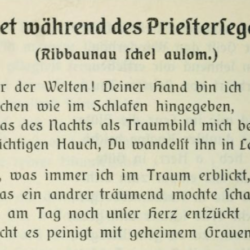| Source (German) | Translation (English) |
|---|---|
Abendlied. |
Evening song. |
Nun laß den Tag, o Vater mein, In Schlaf und Traum versunken sein; In Schlaf und Traum, der unsern Schmerz Zur Ruhe singt im müden Herz, Der uns zu fernen Ufern führt, Die nie des Leides fuß berührt; Doch eh das Dunkel mich umfängt, Mein Herz zuletzt noch Dein gedenkt. |
Now let the day, O father mine, In sleep and dream be left behind; In sleep and dream that sings our pain To rest sings in the weary heart, That leads us to distant shores Which never sorrow’s foot touches; But before the darkness embraces me, My heart at last remembers thee. |
Und wär’ für immer es zuletzt, Und wär’ mir heut’ mein Ziel gesetzt, Und sähe ich kein neues Licht, Und gäb’ es ein Erwachen nicht, Ich würde ohne Sorge sein, Denn, Vater, sieh, ich bin ja Dein. In welchem Schlaf Dein Kind auch ruht, Es weiß, es schläft in Deiner Hut. |
And be it forever at last, And if today my goal were set, And if I saw no new light, And there would be no awakening, I would be without care, For, father, see, I am thine. In whatever sleep your child rests, He knows he sleeps in your keeping. |
Was immer auch der Tag gebracht, Jetzt kommt der frieden, kommt die Nacht, Jetzt löschen alle Lichter aus Und stille wird’s im Erdenhaus; War unser Kummer noch so schwer, Bald fühlen wir die Last nicht mehr; Nichts bleibt, als daß ein Vater wacht Und uns behütet Tag und Nacht. |
Whatever the day brought, Now comes peace, now comes night, Now all the lights go out And silence comes to earth’s house; Were our sorrow still so heavy, Soon we’ll feel the burden no more; Nothing remains but a father watching And protects us day and night. |
שְׁמַע יִשְׂרָאֵל יְהוָֹה אֱלֹהֵינוּ יְהוָֹה אֶחָֽד׃ (דברים ו:ד) | |
Höre, Israel, der Ewige, unser Gott, ist einig einzig. |
Hear, O Israel, the Eternal, our God, is the only one. (Deuteronomy 6:4) |
“Abendlied” by Lise Tarlau can be found in Rabbi Max Grunwald’s anthology of Jewish women’s prayer, Beruria: Gebet- und Andachtsbuch für jüdische Frauen und Mädchen (1907), page 29.
The transcription of the German provided machine-readable text for machine translations by DeepL, which we then edited for accuracy and clarity. We welcome any/all corrections, improvements, and additional transcriptions and translations of this work’s contents. –Aharon Varady
Source(s)


“Abendlied | Evening prayer [for the Bedtime Shema], by Lise Tarlau (1907)” is shared through the Open Siddur Project with a Creative Commons Attribution-ShareAlike 4.0 International copyleft license.










Leave a Reply